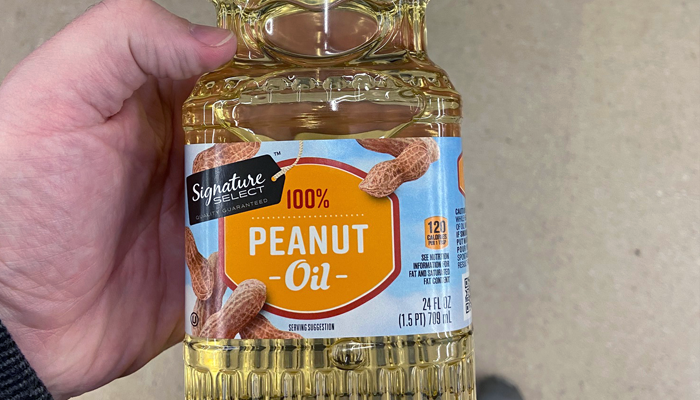As you may have guessed, peanut oil is made by pressing raw or lightly roasted peanuts. The roasted version will have a more robust flavor and aroma, but both have a delicious nutty taste.
Peanut oil is high in monounsaturated fats and low in saturated and trans fats. Peanut oil is 100% allergen-free for those who suffer from peanut allergies. All allergenic proteins are removed during the purification, refining, bleaching, and deodorizing processes.
With a high smoke point of 450 degrees, peanut oil can be used as an oil for deep frying and cooking, and baking.
If you need to find a substitute for peanut oil, a few options should be easy to find on the grocery store shelf.
Contents
Canola Oil Substitute
Peanut oil is used mainly for high heat cooking, but canola oil is a widely used substitute due to its versatility. Canola oil is used for dishes from stir-fry to salad dressings.
Canola oil offers health benefits to lower bad cholesterol and controlling blood glucose levels as it has one of the highest levels of monounsaturated fatty acids. Canola oil also contains the lowest amount of saturated and trans fats.
= 1/2 cup canola oil is a substitute for 1/2 cup peanut oil
Grapeseed Oil Substitute
Many oils come from seeds and grains, so it is no surprise that pressing grape seeds makes grapeseed oil. Grape seeds provide many nutrition benefits, so using this oil to replace avocado oil is natural.
Grapeseed oil’s smoking point is lower and best used for medium-heat cooking. It has a different nutritional profile than peanut oil but is used in many similar recipes. Find grapeseed oil at most specialty markets or natural food stores.
= 1 tablespoon grapeseed oil is equal to 1 tablespoon peanut oil
Grapeseed oil is a type of vegetable oil that is extracted from the seeds of grapes. It is high in antioxidants and nutrients, making it beneficial for both cooking and skin care. Grapeseed oil has a light, delicate flavor and can be used in a variety of dishes. It is also sometimes used as a massage oil or moisturizer.
Corn Oil Substitute
Corn oil is a good peanut oil substitute because it is easy to find on the store shelf and inexpensive. For the best nutritional value, seek out varieties that have been cold-pressed and are labeled organic or unrefined. They possess the monounsaturated and polyunsaturated fats that provide corn oil’s various health benefits.
You can use corn oil for anything you would use peanut oil for, and while it’s very subtle, it even has a slightly sweet nuttiness. Cold-pressed, organic, or unrefined types have lower smoke points than regular corn oil, with a high smoke point like peanut oil.
= 1 cup corn oil is a replacement for 1 cup peanut oil
Corn oil is a food oil derived from the kernels of corn. It is used in many different ways, including cooking, baking, and as a source of nutrition. Corn oil is high in unsaturated fats, which make it a healthy choice for many people. It also has a high smoke point, making it ideal for frying or other high-heat cooking methods.
Corn oil is a versatile product that can be used in many different ways. Whether you are looking for a healthy cooking option or a way to add flavor to your food, corn oil is a great choice.
Avocado Oil Substitute
Avocado oil is a healthy and versatile fat used in the kitchen. Oil is extracted from avocado pulp, while other oils come from seed or grain. Its flavor is grassy and buttery and tends to go well for salads and dressings, but it also works well for frying and sauteing foods. It has a high smoke point of over 500-degrees.
Avocado oil can be pricey and may not be available in all grocery aisles.
= 1/2 cup avocado oil is equal to 1/2 cup peanut oil
When it comes to cooking with avocado oil, the possibilities are endless. This healthy, delicious oil can be used for everything from sautéing and stir-frying to baking and even making salad dressings.

FAQ
Can someone with a peanut allergy eat food fried in peanut oil?
Peanut oil is 100% allergen-free for those who suffer from peanut allergies. All allergenic proteins are removed during the purification, refining, bleaching, and deodorizing processes.
Medical studies show that most people with peanut allergies can safely eat this peanut oil. Cold-pressed, expelled, or extruded gourmet peanut oils should be avoided. To be safe, you should confer with your doctor about whether you should avoid highly refined peanut oil.
Can you substitute peanut oil in baking?
Peanut oil is a high-heat oil often used for deep-frying and other cooked dishes. It is versatile and can be used in baking if you don’t have another oil.